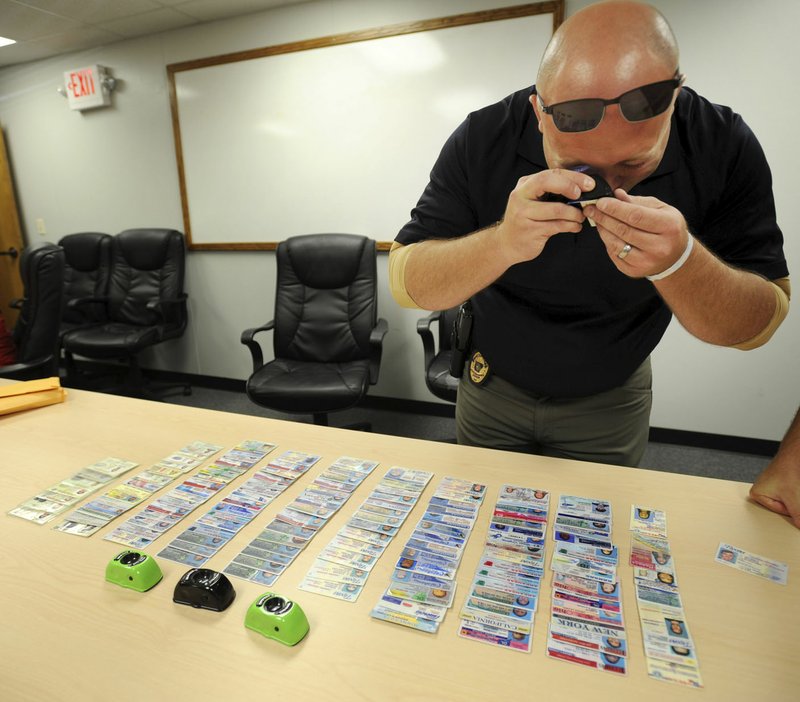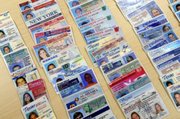FAYETTEVILLE -- Underage drinking and fake IDs can be an issue anywhere, but the problem amplifies when 20,000 undergraduates roll into town.
Police were out in force on Dickson Street last weekend before college classes began.
Penalties
Charges related to underage drinking have varying penalties.
Minor in possession of alcohol: The person under 21 has bought alcohol or has alcohol, in or outside of the body. Charges can result in a fine of $100 to $500 and a 60-day suspension of driver’s license for first offense.
Public intoxication: The person is likely to endanger himself or herself or another person or property or the person unreasonably annoys someone in the vicinity. Penalties can range from 30 days’ jail time, $500 fine, court costs, community service and a charge that will show up on future background checks.
Possession of fraudulent personal identification for minors: Charges can result in a 60-day suspension of driver’s license for first offense.
Source: Arkansas Code
"We try to schedule around when the kids come back, dead day, times like that when historically speaking they've been very popular drinking days," Cpl. Dallas Brashears said.
The point isn't to hit students with large fines or ruin their lives, he said. "The point is to discourage underage drinking and the DWIs and crimes and just general problems that come with it."
Undercover and patrol officers issued 57 citations for underage drinking violations Aug. 17-19. About 30 of those were handed to minors at a private party at Hog Haus Brewing Co., according to the Police Department.
Owner Julie Sill said they have tons of private parties at Hog Haus and never have any issues. Those found drinking at the party admitted they were drunk when they came in or sneaked in alcohol, she said. A detailed police report will not be available until next week, Brashears said.
"This one kind of caught everyone off guard," she said. "It's just not something that we have ever had happen. It's definitely not something we condone at all. I don't tolerate it."
At Hog Haus, those younger than 21 are marked with a big X on each hand when they come through the door. "If we see you raise a drink in one of those hands, we confiscate it," Sill said. Those 21 or older get their hand stamped.
However, she said, "People who want to do something that badly will find a way."
Those younger than 21 account for 11 percent of all alcohol consumed in the United States, according to the Centers for Disease Control and Prevention. People under age 21 made about 189,000 visits to emergency rooms for injuries and other conditions linked to alcohol in 2010, according to the most recent CDC data available.
How To Spot Fakes
Every year fake IDs get better, Brashears said. Many come from China hidden in toys or a deck of cards, he said.
"They learn the security features, and a lot of times the only thing wrong is one minor flaw or a mixture of minor flaws that only someone who checks these regularly will see," Brashears said. "You have to pick up on the clues. You read their body language when they hand it to you just as much as you do the ID."
Brashears is part of the Cops in Shops program where police officers work in businesses just as an employee would, checking IDs and giving pointers to employees.
"I try to work with the clerks and servers as much as possible. We are not here to try to get them in trouble," he said. "We want them to be able to spot fake IDs when we are not there."
He also runs training sessions for employees at local bars and stores on how to spot fake identification.
Some businesses offer a bounty. Dickson Street Liquor clerks have attended training and earn $25 for each fake they find.
Clay Grace, a clerk, said they catch the most fakes at the beginning of the school semesters.
"That's when everyone is rushing and they get hooked up with them," Grace said.
James Trotter, a senior at the University of Arkansas, said his friends have ordered IDs online, often getting a copy, "so you have a backup if one is confiscated."
They cost from $100 to $300, and people will buy them in groups on a website such as IDChief to get a discount, Grace said.
Fake Arkansas IDs are easy to spot, so people often get them with states from farther away and that makes them stand out, Brashears and Grace said. The likelihood of seeing multiple legitimate Rhode Island IDs at once is pretty slim, Brashears said.
Business owners are trying to keep up as the technology improves. Some employees scan the back of IDs, but that's not a guarantee of detection.
"The bar code or other scanning device on the back of IDs can be replicated with the proper information," Brashears said.
Even before last weekend, Sill said she has been looking into better ways of checking identification. She plans to invest in a government-issued scanner, instead of having doormen use phone apps, and asking for two forms of identification.
"They will have to have their driver's license and then something else with their name on it," Sill said. "We are going to have to make sure the ID itself is legitimate, but also that it is legitimately your ID."
Some places aren't as diligent as others and some underage people figure out where and where not to go.
"I never have had a fake ID, but my friends have and have gotten into bars easy," said Trotter, who is now 23. "In my case, I've gotten into 18-plus places. They stamp you, but it's pretty easy to just wash off whatever they mark you with. We've done it with plastic wristbands too."
Getting Caught in a College Town
Minor in possession is the usual underage drinking citation, according to the city and university police.
About 170 people have been sent to the Washington County Detention Center since January and about 220 in 2016, according to the Sheriff's Office.
However, most underage drinkers who are cited do not go to jail.
"Usually someone will end up in jail for public intoxication. We go way out of our way not to arrest people, especially on Dickson Street. It's a college town. We understand it," Brashears said. "When we talk to somebody, we will check to see if they have friends with them, if they have a phone, if they can get home safely. Once we have exhausted all those avenues, then we don't have a choice but to take them to the jail or hospital, depending on the level of intoxication."
Police issue a driver's license suspension form along with each citation.
In Arkansas, the punishment for someone charged with minor in possession of alcohol can range from a fine of between $100 and $500 along with a 60-day license suspension for first offense.
Underage university students who are caught drinking -- whether by police or a university staff member -- may also have to face the campus conduct board. Nearly 700 students were referred for disciplinary action for liquor law violations in 2015, according to campus crime statistics.
Some departments and scholarships have a zero tolerance policy and getting in trouble with underage drinking can hurt a student's academic career, said Capt. Gary Crain, University of Arkansas Police Department's public information officer.
Darby Guinn, a 2017 English and journalism graduate, said she avoided Dickson Street before turning 21 because of all the possible repercussions.
"I threw parties, because I didn't want to shell out the money for an ID or figure out the Dickson game and possibly get kicked out or in trouble," she said.
The university does have a policy that allows students, regardless of age or if they have been drinking, to call for assistance if "confronted with a serious case of alcohol intoxication" without worry of academic disciplinary repercussions at the university.
"It's really been beneficial to the students," said Asher Morgan, who leads the university's substance education alcohol resource department. "We've talked about it enough that students know what to look for, and the fact that that phone call is being made is a good thing, because they are being an active bystander."
NW News on 08/27/2017

